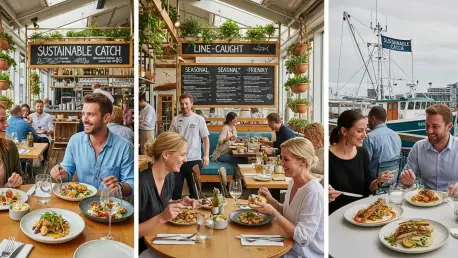In a world where the demand for seafood continues to soar, the hospitality industry faces mounting pressure to ensure ethical and environmentally responsible sourcing, a challenge that the global hotel brand Novotel has boldly taken on by becoming the first hospitality member of the Seafood Task Force (STF). Operating under the Accor Group, Novotel manages around 600 properties across more than 60 countries, positioning it as a significant player in the sector with the potential to drive transformative change. This partnership marks a pivotal moment, highlighting a shift toward greater accountability in how hotels procure seafood for their dining and event services. Issues such as illegal fishing, forced labor, and environmental degradation are no longer distant problems but immediate concerns that can impact reputation and operations. By aligning with STF, a platform comprising over 50 major retailers and foodservice companies, Novotel is taking a proactive stance to address these risks, particularly in high-risk regions like Thailand, Vietnam, and Indonesia. This move not only reflects a response to regulatory and consumer demands but also sets a benchmark for sustainable practices in hospitality.
The Importance of Sustainable Seafood Sourcing
Hospitality’s Role in Supply Chain Responsibility
The hospitality sector, often overlooked in discussions about seafood sustainability, plays a crucial role as a major consumer of seafood for guest dining and large-scale events, placing brands like Novotel at the forefront of supply chain responsibility. With vast quantities of seafood passing through hotel kitchens annually, the industry’s purchasing power can significantly influence upstream practices. Challenges such as overfishing, which depletes marine ecosystems, and human rights violations in fishing communities are now recognized as direct risks to hotel operations. Novotel’s decision to join STF underscores a growing realization that hotels must actively engage with these issues rather than remain passive buyers. By prioritizing transparency and ethical sourcing, the brand aims to mitigate the environmental and social harm tied to its supply chain, setting an example for how hospitality can contribute to broader sustainability goals in the seafood industry.
Beyond the immediate operational impacts, this shift in focus highlights the interconnectedness of global supply chains and the hospitality industry’s potential to drive systemic change through responsible procurement strategies. Novotel’s commitment to addressing traceability gaps ensures that seafood served in its properties can be tracked back to sustainable and ethical origins. This is particularly critical in regions where oversight is often weak, and illegal practices can go unchecked. The partnership with STF provides access to tools and frameworks that help identify and eliminate risks like forced labor, which remains a pervasive issue in seafood production. By taking on this responsibility, Novotel not only protects its brand from reputational damage but also contributes to the protection of marine biodiversity and the livelihoods of fishing communities, demonstrating that hospitality can be a force for positive impact in global supply chains.
Impact on Brand Reputation and Guest Expectations
Novotel’s alignment with STF serves as a powerful statement to guests and investors who increasingly prioritize environmental consciousness and ethical practices when choosing where to stay or invest. In an era where transparency is valued, travelers are more likely to support brands that demonstrate a commitment to sustainability, especially in areas as visible as food sourcing. Seafood, often a staple on hotel menus, becomes a focal point for scrutiny, with guests expecting assurances that their meals are not contributing to overfishing or labor abuses. By taking proactive steps through this partnership, Novotel strengthens its reputation as a responsible corporate entity, potentially gaining a competitive edge in a crowded market where differentiation on ethical grounds is becoming a key factor for consumer loyalty and trust.
Moreover, this initiative resonates with a broader shift in guest expectations, where sustainability is no longer a niche interest but a mainstream demand influencing booking decisions across demographics. Novotel’s efforts to integrate sustainable seafood sourcing into its operations can enhance guest experiences by aligning with values of social and environmental responsibility. This alignment not only fosters loyalty among eco-conscious travelers but also positions the brand favorably with stakeholders who monitor corporate governance and sustainability metrics. The potential for positive media coverage and industry recognition further amplifies the benefits, as Novotel’s pioneering role in sustainable seafood sourcing could inspire confidence among partners and customers alike. Ultimately, this strategic move transforms a potential risk area into a cornerstone of brand identity, showcasing how ethical practices can drive both business value and societal good.
Collaboration as a Path to Progress
Leveraging Multi-Stakeholder Platforms
The Seafood Task Force offers a unique pre-competitive environment where diverse industry players, from fishing vessels to major buyers, unite to develop shared solutions for complex supply chain challenges, an opportunity Novotel has seized to enhance its sustainability efforts. Comprising over 50 influential members, the STF provides resources such as vessel risk assessments and worker welfare mechanisms that individual companies would struggle to implement alone. For Novotel, access to these tools is invaluable, especially when addressing issues in high-risk seafood sourcing regions like Southeast Asia. The collaborative nature of the platform ensures that strategies are not only comprehensive but also scalable, allowing the hotel brand to tackle systemic problems like environmental degradation and labor violations with greater efficacy. This collective approach fosters innovation in supply chain oversight, proving that joint efforts can yield results beyond the reach of isolated initiatives.
Additionally, the multi-stakeholder model of STF facilitates the exchange of data and best practices, enabling Novotel to refine its procurement policies in alignment with global standards for sustainability and human rights. This collaboration reduces the burden of developing independent systems for traceability and supplier accountability, which can be resource-intensive for a hospitality brand with a vast global footprint. By tapping into the expertise of retailers, seafood brands, and other foodservice companies within STF, Novotel can address nuanced challenges, such as ensuring compliance with diverse regional regulations while maintaining operational efficiency. The platform’s emphasis on harmonized standards also helps streamline efforts to monitor and improve conditions at sea, where oversight is often limited. Through this partnership, the brand not only enhances its own practices but also contributes to a broader industry movement toward responsible seafood sourcing, amplifying the impact of collective action.
Setting a Precedent for Other Hotel Brands
Novotel’s pioneering membership in STF could serve as a catalyst for other hospitality brands to engage in similar partnerships, potentially reshaping how the industry approaches seafood sustainability on a global scale. As the first hotel chain to join this initiative, the brand sends a clear signal that hotels are integral to addressing supply chain risks, moving beyond their traditional role as end consumers. This bold step may encourage competitors to follow suit, recognizing that collaboration offers a viable path to manage reputational and regulatory pressures associated with seafood sourcing. If more hotel brands adopt such frameworks, the cumulative effect could lead to significant improvements in traceability and ethical standards across the sector, creating a ripple effect that benefits marine ecosystems and vulnerable communities reliant on fishing industries.
Furthermore, Novotel’s involvement highlights the potential for industry-wide transformation through leadership and shared responsibility, inspiring a shift from individual to collective accountability in hospitality. By demonstrating measurable progress in areas like reducing overfishing or eliminating forced labor from its supply chain, the brand can provide a tangible model for others to emulate. This precedent-setting action also underscores the importance of aligning with established platforms like STF, which offer structured pathways to address complex issues that no single entity can solve alone. As more hotels witness the benefits of such collaborations—ranging from enhanced brand trust to compliance with tightening legislation—the momentum for sustainable practices could accelerate. This trend would not only elevate industry standards but also contribute to long-term environmental and social gains, positioning hospitality as a key player in the global push for responsible seafood sourcing.
Integrating Sustainability into Operations
Novotel’s Ocean Roadmap and Regional Initiatives
As part of a comprehensive strategy developed with WWF France, Novotel has outlined an ambitious ocean roadmap that sets clear targets, such as removing over 350 endangered seafood species from its menus by 2027, reflecting a deep commitment to sustainable practices. This plan goes beyond mere compliance, aiming to serve only seafood certified by recognized bodies like the Marine Stewardship Council for wild catch and the Aquaculture Stewardship Council for farmed varieties such as salmon and shrimp. Alongside these global goals, the brand has initiated regional projects to address local challenges, including a fishery improvement program for Indian squid in Kerala and a traceability partnership in the Middle East. These efforts illustrate how sustainability is being embedded into the core of Novotel’s operations, ensuring that environmental responsibility influences every level of decision-making, from menu planning to supplier selection.
In tandem with its global commitments, Novotel’s focus on localized initiatives demonstrates an understanding that sustainability requires tailored solutions to address specific regional dynamics and challenges within seafood supply chains. For instance, the project in Kerala aims to improve fishing practices in a region where small-scale fisheries are vital to local economies, ensuring that sustainability does not come at the expense of livelihoods. Similarly, the Middle East partnership focuses on enhancing transparency in a market where seafood trade routes can be complex and opaque. By integrating these regional actions with broader goals, Novotel creates a cohesive framework that balances global standards with local needs. This dual approach not only strengthens the brand’s ability to effect change across diverse geographies but also showcases a nuanced strategy that prioritizes both environmental impact and community support, reinforcing its leadership in sustainable hospitality.
Balancing Ethical Goals with Operational Realities
While Novotel strives to meet high sustainability standards through its partnership with STF, it must also navigate the practical challenges of ensuring that suppliers, particularly in developing regions, can comply without facing undue economic hardship. Many suppliers in areas like Southeast Asia operate on tight margins, and imposing stringent requirements for ethical and environmental practices can strain their resources if not supported by adequate guidance or incentives. The brand faces the task of fostering compliance through capacity-building initiatives and fair partnerships, ensuring that sustainability goals do not inadvertently harm vulnerable stakeholders in the supply chain. This delicate balance requires careful planning to align ethical aspirations with the operational realities of a global network, highlighting the complexity of implementing transformative change across diverse economic contexts.
Moreover, achieving this equilibrium demands ongoing dialogue with suppliers to understand their constraints while providing tools and training to meet sustainability benchmarks, a process that Novotel is addressing through its STF collaboration. The brand must also consider the cost implications of sustainable sourcing, as certified seafood often comes at a premium, potentially impacting pricing strategies or profit margins. To manage this, integrating sustainability into long-term operational planning, rather than as a short-term fix, is essential, allowing for gradual adjustments that minimize disruption. Additionally, educating staff and guests about the value of these efforts can help justify any associated costs, turning ethical practices into a marketable asset. By addressing these operational challenges head-on, Novotel not only advances its sustainability agenda but also builds a resilient model that can adapt to varying global conditions, ensuring that ethical goals translate into sustainable outcomes.
Navigating Regulatory and Consumer Pressures
Adapting to Tightening Legislation
With governments worldwide intensifying regulations on human rights and environmental impact, Novotel faces growing legal scrutiny through frameworks like the UK’s modern slavery reporting requirements and the EU’s due diligence laws on forced labor, necessitating robust procurement policies. These legislative measures demand that companies demonstrate accountability for their supply chains, pushing hospitality brands to adopt transparent practices or risk penalties and reputational damage. Joining STF equips Novotel with structured mechanisms to comply with such mandates, offering tools for supplier oversight and data collection that align with international standards. This proactive adaptation not only mitigates legal risks but also positions the brand as a compliant and responsible player in a regulatory landscape that is becoming increasingly stringent for global businesses.
Furthermore, the evolving nature of these laws means that compliance is not a one-time effort but an ongoing process requiring continuous improvement and vigilance, a challenge Novotel is addressing through its STF partnership. The collaboration provides access to up-to-date insights on regulatory trends, enabling the brand to stay ahead of emerging requirements in different regions. For instance, ensuring that seafood sourced from high-risk areas meets due diligence criteria involves detailed monitoring and reporting, tasks made more manageable through STF’s shared resources. This strategic alignment with legal expectations also helps safeguard against potential disruptions, such as import bans or supply chain interruptions caused by non-compliance. By embedding regulatory adherence into its sustainability framework, Novotel demonstrates a forward-thinking approach that prioritizes long-term stability over short-term gains, reinforcing its commitment to ethical operations.
Meeting Rising Guest Expectations
Today’s travelers are more informed and discerning, often expecting the brands they patronize to uphold transparency and ethical standards, a trend that places additional pressure on Novotel to deliver on sustainability promises in its seafood sourcing. Guests increasingly seek assurances that their dining choices do not contribute to environmental harm or social injustices, making sustainability a key factor in their perception of a hotel’s value. Through its affiliation with STF, Novotel responds directly to these expectations by ensuring that seafood served across its properties adheres to responsible practices. This commitment builds trust and fosters loyalty among guests who prioritize ethical considerations, enhancing the brand’s appeal in a market where consumer preferences are shifting toward socially responsible businesses.
Additionally, meeting these expectations involves more than just sourcing practices; it requires communicating efforts effectively to guests to create a meaningful connection between the brand’s actions and their values, an area where Novotel is focusing through educational initiatives. By highlighting its sustainability journey—whether through menu annotations or digital content—the brand can engage guests in its mission, turning a backend operation into a guest-facing strength. This transparency not only differentiates Novotel from competitors but also aligns with broader societal trends favoring accountability. The potential to attract a growing segment of eco-conscious travelers offers a significant business advantage, as positive guest experiences can translate into repeat visits and word-of-mouth endorsements. Ultimately, by addressing consumer demands through tangible actions and clear messaging, Novotel solidifies its position as a leader in responsible hospitality, meeting the evolving needs of its global clientele.
Challenges and Opportunities Ahead
Addressing Systemic Supply Chain Issues
Despite the promising start with STF, Novotel faces the daunting task of confronting deeply entrenched systemic issues like forced labor and overfishing, which have long plagued global seafood supply chains and require sustained, collaborative efforts to resolve. These challenges are particularly acute in regions such as Southeast Asia, where weak governance and economic pressures often perpetuate unethical practices. The partnership with STF offers a critical opportunity to leverage industry expertise and collective action to address these problems, providing frameworks for improving labor conditions and reducing environmental impact. However, the complexity of these issues means that progress will not be immediate, demanding persistent commitment to drive meaningful change. Novotel’s focus on specific seafood categories like tuna and shrimp serves as a strategic entry point, allowing for targeted interventions that can yield measurable results over time.
Moreover, tackling these systemic issues involves navigating a web of stakeholders, from local fishing communities to international regulators, each with distinct interests and constraints, a dynamic Novotel must manage through its STF collaboration. Building trust with suppliers to adopt better practices while advocating for stronger industry standards requires a nuanced approach that balances enforcement with support. The opportunity lies in creating a ripple effect—improvements in one area of the supply chain can influence others, gradually shifting norms toward sustainability. For instance, enhanced traceability can deter illegal fishing, while better labor standards can improve worker welfare across regions. Though the road ahead is challenging, the potential to contribute to lasting industry reform positions Novotel as a key player in reshaping seafood sourcing, provided it maintains focus and resources on these critical areas for the long haul.
Scaling Sustainable Practices Globally
While Novotel’s initial focus on specific regions and seafood types offers a practical starting point for sustainability, scaling these efforts across its extensive global portfolio presents a formidable challenge that tests the brand’s long-term dedication and resource allocation. With properties spanning over 60 countries, each with unique supply chain dynamics and regulatory environments, implementing uniform sustainable practices is a complex endeavor. The success achieved in high-risk areas like Thailand or Vietnam must be replicated and adapted to other markets, requiring tailored strategies that account for local conditions. This scaling process demands significant investment in training, supplier partnerships, and monitoring systems to ensure consistency without compromising on ethical standards. STF’s collaborative resources can ease this transition, but the magnitude of the task underscores the need for a phased, strategic approach to achieve global impact.
Furthermore, the process of scaling involves overcoming logistical hurdles and cultural differences that can affect the adoption of sustainable practices across diverse regions, an aspect Novotel must address to maintain momentum. For example, sourcing certified seafood in markets where such options are limited requires developing alternative supply chains or supporting local certification efforts, both of which take time and coordination. Engaging staff at every property to understand and champion these initiatives is equally critical, ensuring that sustainability becomes a shared value rather than a top-down mandate. The opportunity to lead by example on a global stage is immense—if Novotel can demonstrate that sustainable seafood sourcing is feasible at scale, it could inspire systemic change across the hospitality sector. Success in this endeavor hinges on sustained effort and adaptability, turning a complex challenge into a defining achievement for the brand’s legacy in responsible hospitality.









